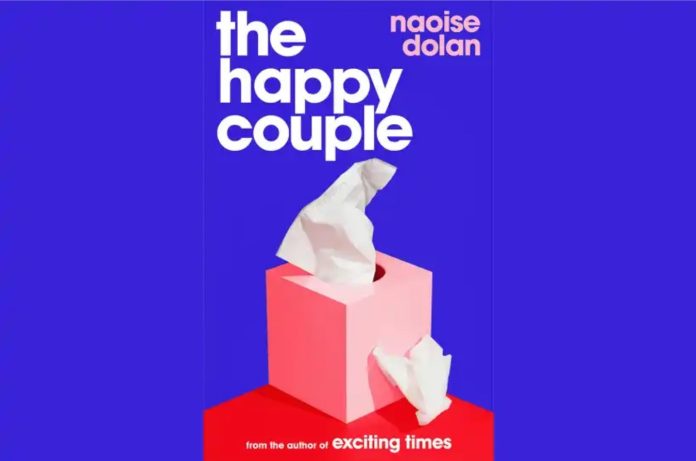The gaps we find between what we want and what we get
Naoise Dolan’s debut novel, Exciting Times (2018), gifted readers with a wry, self-reflexive look at monogamy, class, and the actual horror of ‘being seen’ we all find so easy to ignore. Her new novel, The Happy Couple (2023), departs from this horror into a more mature look at modern relationships, and the gaps we find between what we want and what we get. Dolan manages to weave all her insights into the tightly packed, bitterly Irish novel, with her typical expression—so sharp it could cut you.
The titular (not so) happy couple at the centre of the book are Celine and Luke. Celine is a professional pianist and Luke is a serial cheater (a genuinely refreshing take to have the woman defined by her career, and the man defined by his sexual habits). Their engagement occurs as a result of both partners realising they’d rather stay together than break up. Internally Celine wonders, however, are they happy? These words are never spoken aloud. The couple does not, “as a rule, ‘share feelings’. Celine’s family had never taught her how.”
Dolan includes these nods towards family, and what they do for/to us, masterfully throughout the novel. Celine’s family is big, her father is conspicuously absent, and her aunt and uncle see themselves as her second parents. Luke’s father is also absent, but worse somehow. He was raised by his mother in London. Dolan doesn’t dwell on either character’s family history for long, instead allowing us to grab at what we can in an effort to piece together the complexity that is a person’s life.
The rest of the novel, post-engagement, follows the ensemble cast’s experience of, and relationship to, the doomed wedding: we have, of course, Celine (The Bride) and Luke (The Groom); additionally, there is Celine’s younger—and much wilder—sister Phoebe (The Bridesmaid), and Luke’s friends Archie (The Best Man) and Vivian (The Guest). Both Archie and Vivian have dated Luke in the past, with differing long-term effects. Each character is granted a slice of the book and in return we are granted a slice of them. All are defined in their connection to Luke. (A personal favourite one-sentence summation of one such connection: “Phoebe wanted Luke in the Somme.”)
Luckily for him, Luke is defined in connection to no one but himself.
I couldn’t help but anxiously await the next character’s perspective as the story unfolds. Dolan’s key success in the novel is being unafraid to jump into entirely new spaces, whether it be that occupied by Luke-hating dropkick bartender Phoebe, or coke addict Luke-yearning lawyer Archie. Moreover, she manages to merge these spaces with a confidence that results in surprising, yet real, scenes. Phoebe and Archie are on opposite ends of the spectrum, in relation to each other and in terms of their relationship to Luke, but manage to have the most authentic conversations in the novel.
Dolan chooses to voice Luke’s chapters in direct address. This occurs entirely through his notes app entries the night before the wedding. The contrast to the rest of the novel is startling. Why should this man be allowed to construct himself in the reader’s eyes when no one else has that privilege? But then, of course he must be written through his own eyes. He is a person equal parts self-aware and self-ignorant, unable to commit even to a stable definition of himself. He is the kind of guy that declares himself “bad at relationships” then simultaneously claims he would end things with a partner if he thought they’d never get married.
Despite her brilliant expression, and continuous spatter of bitingly real asides throughout the novel— (“It’s a fool’s errand claiming not to mind it when people don’t do things. If you didn’t mind, you wouldn’t notice them not doing it.”)—Dolan comes dangerously close to platitude in her treatment of the marriage plot, and marriage in general. A central pillar of the text is a commentary on the overbearing weight of heteronormativity, even in the lives of our almost entirely queer cast of characters. The idea is brought up effectively, but Dolan seems to halt a step away from following this through to its entirety. Are all marriages doomed from the start? Does marriage even have a place in the western world, so concerned as it is with independence and self-autonomy? Does queerness inherently involve instability?
In the final analysis, however, The Happy Couple concerns itself with only one marriage, and one distinctly unhappy couple. While some questions are left unanswered, Dolan’s fresh expression is unmatched in its deceptive simplicity and delicious turn of phrase. She doesn’t concern herself with the universal, instead allowing us a glimpse into a singular moment in time, populated by real and complicated people.


